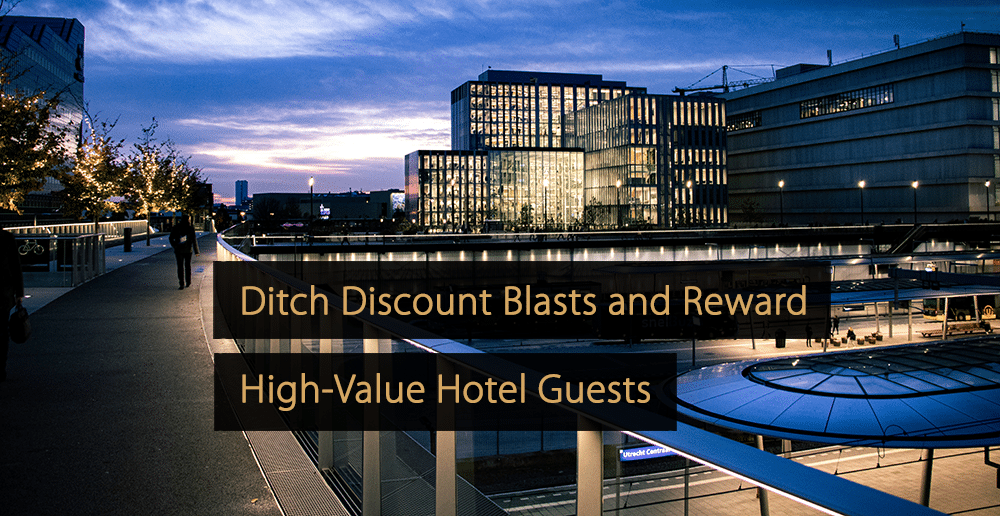Business travel is booming, with more and more people making at least one business trip every year. Is your hotel ready to take full advantage of the latest business trip trends? In this article, you’ll learn about the 8 top trends in 2026 for business travel. Read on to discover trends like bleisure travel, hybrid accommodation spaces, and more.
Table of Contents:
- What Is the Hotel Industry?
- What Is Considered a Business Trip?
- Significance of Business Trips for Hotels
- 8 Business Trip Trends for Hotels in 2026
- Business Travel Agencies
- Hotel Events
What Is the Hotel Industry?
Before discussing business trips, it’s a good idea to consider the hotel industry in general. The term “hotel industry” covers every type of business that could be termed a hotel, meaning any establishment offering guests overnight lodging.
The industry can be considered in various market segments, including economy, mid-range, and luxury hotels. It can also be divided into different types of guests, such as families and couples, those traveling for education, and business travelers. These different categories of travelers all have different needs.
For example, a family touring a city with their children and a party of convention-goers who need meeting rooms and conference facilities will have different ideas about what makes a great hotel stay. To learn more about the hotel business, the different types of hotels, and the different sectors they serve, read “Hotel Industry: Everything You Need to Know About Hotels!”
What Is Considered a Business Trip?
To understand business trip trends, let’s first define a business trip. In general, business travel is any kind of travel undertaken for business dealings or on behalf of your employer. In today’s world, many professions involve some kind of business travel.
This might only happen a few times in a person’s career or be a regular event. Salespeople and consultants are two of the most obvious roles that might require frequent business travel. Engineers, technicians, and other skilled personnel may need to travel to different work sites. Trainers, educators, and academics must often travel.
Medical professionals like doctors will frequently make work-related trips. Athletes and sportspeople, like lawyers, journalists, and politicians, frequently travel. All these different journeys can be considered business trips. “7 Tips to Attract More Corporate Travelers to Your Hotel“ discusses corporate travel in depth.
Significance of Business Trips for Hotels
Professionals on business trips are an important market for hotels. Because travel is cheaper and business events are more popular, business travelers seeking hotel accommodations have grown significantly in recent years.
These are often repeat trips, as many travelers need to return to the same destination several times a year. This is a great opportunity for any hotel these people visit: if an establishment makes a good impression, the guest will likely choose that hotel for future trips.
Whether or not a guest returns, they will likely have colleagues and professional acquaintances who will need to travel to the same area and will ask them for a recommendation. A great stay will mean recommendations for your hotel, bringing in enthusiastic new customers. Because business trips are arranged in advance, they represent a solid source of cash flow for your hotel.
Business Trip Trends for Hotels in 2026
In this section, you’ll discover some of the hottest trends in business travel for 2026 and beyond.
1. Bleisure Travelers
Bleisure travel is a blending of business travel and leisure travel. It’s a logical upshot of the increase in business travel. If you’re going to visit a business destination, why not explore what the area offers in terms of sightseeing, excursions, or adventure?
Generally speaking, this kind of “bizcation” involves completing the business element and extending one’s stay to unwind and enjoy leisure activities. There are many advantages to this kind of arrangement, not least the morale boost it provides for busy professionals. This increases productivity and means that staff is more accepting of travel as part of their jobs.
From the perspective of the hotel and tourism industries, bleisure travel means additional revenue. Guests book longer stays and spend more time in an area, resulting in a financial boost. To learn more about bleisure travel, read “What is Bleisure Travel? What Are Bleisure Travelers Looking For?“
Video: What is Bleisure Travel?
2. Demand for Sustainability
Today’s eco-conscious travelers seek new and more sustainable travel methods. This is true for business travel as well as leisure. Companies are increasingly alert to environmental issues, reflected in how they arrange business travel. Many companies will look for accommodation with a focus on sustainability.
This represents an opportunity for hotels to shine by emphasizing their green and eco-friendly features and policies. It can be a real selling point if you show corporate travelers that you have a solid sustainability policy across all your hotel departments. Show that your hotel is committed to reducing waste, saving energy, and minimizing environmental impact.
If your hotel has eco-friendly features, like solar, wind, or geothermal power, sustainably sourced building materials, or ecologically beneficial activities in the local area, be sure to showcase these. Additional hotel financing opportunities may also exist if you’re planning an eco-hotel.
3. Local Experiences
A hotel is far more than a convenient and comfortable lodging. For travelers, whether in the area for leisure or business, a hotel can be the home base from which they may explore a new town or city. Particularly in the case of overseas travel, a hotel represents an access point for the culture and history of the location.
Your hotel can meet this need by offering travel experiences that corporate travelers will appreciate. Even the busiest conference-goer will have time to sample the local cuisine in your hotel’s restaurant or through partner restaurants and other outlets in your locale. For the more ambitious, consider offering cooking classes.
Guests might also enjoy excursions to sites of historic or cultural interest, local festivals, and other entertainment. Guided tours of the area are often appreciated. Connecting with the local culture through your hotel is a major draw for business travelers.
4. Hybrid Accommodation Spaces
Another major trend in recent years has been the rise of remote work. Working remotely, at least part of the time, has become a way of life for many people. Even while engaging in business travel, people often need to engage in remote work.
They may need to coordinate with their workplace, attend virtual meetings, or simply keep up with a side hustle while on the road. To meet these needs, many hotels now offer hybrid workspaces. These are carefully designed meeting rooms with all the features guests need to engage in remote work.
They have broadband Wi-Fi, video conferencing equipment, and versatile layouts to facilitate work with a remote component. By offering this space, your hotel can attract traditional business travelers and the new breed of digital nomads. Hybrid spaces are relatively easy to implement within the average hotel budget.
5. Increase in Corporate Retreats
Destination business retreats have always been around, but they’re becoming increasingly popular with today’s businesses. While work might feature to some degree, a corporate retreat is mostly focused on fostering closer links between colleagues so that they can work together more effectively.
Once the preserve of high-paid executives, many businesses are now seeing the value of retreats for employees at all levels. A corporate retreat is often a regular occurrence, held every year or sometimes more frequently. It’s not uncommon for some companies to hold corporate retreats every month. Because the purpose of a corporate retreat is relaxation, a pleasant and convivial atmosphere is vital.
Hotels need to provide a space that’s conducive to connection and unwinding. Special attention needs to be paid to details like housekeeping duties, to promote a feeling of escape from the daily grind. Guests won’t be able to relax in shabby surroundings.
6. Experiential F&B
F&B (food and beverage) is a key part of a hotel stay. During a corporate event, mealtimes are often a high point of the day: a time for guests to set aside the stress of a busy conference or training schedule and enjoy delicious food in a relaxed atmosphere.
Hotels can turn mealtimes into even more of an experience by introducing innovative cuisine and novel food service styles. It’s increasingly common for hotels to partner with gourmet restaurants in the area or fly in celebrity chefs to prepare unique menus for their guests. This can be especially attractive for corporate travelers and event organizers.
A well-curated range of beverages complementing the food is also a must; fine wines, signature cocktails, and craft beers will help guests relax after a long day. Don’t overlook the appeal of local food and drink when planning a menu for corporate customers.
7. Flexible Booking Policies
As you’ve already seen, business travelers often book well in advance. Given the unpredictable nature of today’s world, this often means that circumstances will change between the booking and check-in dates.
A traveler might have to go to a different site, a conference might need to be moved up or postponed, or a retreat may need to be canceled. In such cases, guests and organizers might need to amend dates or cancel their stay. Allowing flexibility in your booking policies gives travelers and organizers peace of mind.
Making your booking policies too flexible can affect revenue, as well as create headaches for hotel management. Still, some flexibility will make your hotel more attractive to business travelers and corporate clients. Consider allowing cancellations within a certain timeframe, partial refunds, or free amendments if the change is within a day or two of the original booking.
8. Contactless Check-in and Check-out
Contactless hotel technology is increasing in both sophistication and popularity. Since the COVID-19 pandemic, the adoption of contactless technology has become widespread as a measure to control infection and keep guests and staff safe. It’s also convenient and less time-consuming than traditional check-in methods, which is important to busy corporate travelers, and streamlines hotel operations.
There are various ways to implement contactless check-in. Physical check-in kiosks are increasingly popular. Many hotels eschew this method in favor of other hotel POS systems or mobile check-in apps. Contactless check-in can be integrated with smart locks, activated on check-in, and operated with a PIN code or the customer’s mobile device.
There’s a strong trend towards adopting this kind of technology throughout the industry, as more and more guests embrace the security and convenience of contactless check-in and check-out systems. To learn more, read “Mobile Check-In App for Hotels: What Are The Benefits?“
Video: Touchless Check-In at Hilton Norfolk THE MAIN
Business Travel Agencies
Travel agencies, both traditional and online, are a mainstay of modern hotel marketing. Many travel agencies nowadays specialize in particular kinds of travel, including business travel. With the growth of corporate travel, business travel agencies are more popular than ever. Also termed travel management companies, these agencies help to make business travel easier and more cost-effective.
As well as handling complicated travel and accommodation arrangements, business travel agencies can offer perks, discounts, and inside knowledge. To find out more, read “Reasons Why Companies Should Use a Business Travel Agency“ today.
Hotel Events
Hotel events are conferences, conventions, and expos aimed at professionals in the hotel industry. They create valuable networking opportunities and discover the latest developments in the hotel industry. If you’re a hotel owner or manager, attending a hotel event allows you to interact with professionals in your industry.
Hotel events give you valuable insights into everything from the latest technology to staying on top of hotel maintenance. They’re a source of inspiration for decor, themes, marketing tactics, and much more. In “Hotel Events: The Best International Events to Inspire Hoteliers“, you’ll discover some of the top events for hoteliers worldwide.
Business Trip FAQs
Business travel is a growing market and one that no hotel owner can afford to ignore. Finding ways to attract and retain guests who travel on business can make a huge difference to your hotel’s revenue.
More Tips to Grow Your Business
Revfine.com is the leading knowledge platform for the hospitality and travel industry. Professionals use our insights, strategies, and actionable tips to get inspired, optimize revenue, innovate processes, and improve customer experience.Explore expert advice on management, marketing, revenue management, operations, software, and technology in our dedicated Hotel, Hospitality, and Travel & Tourism categories.









Leave A Comment